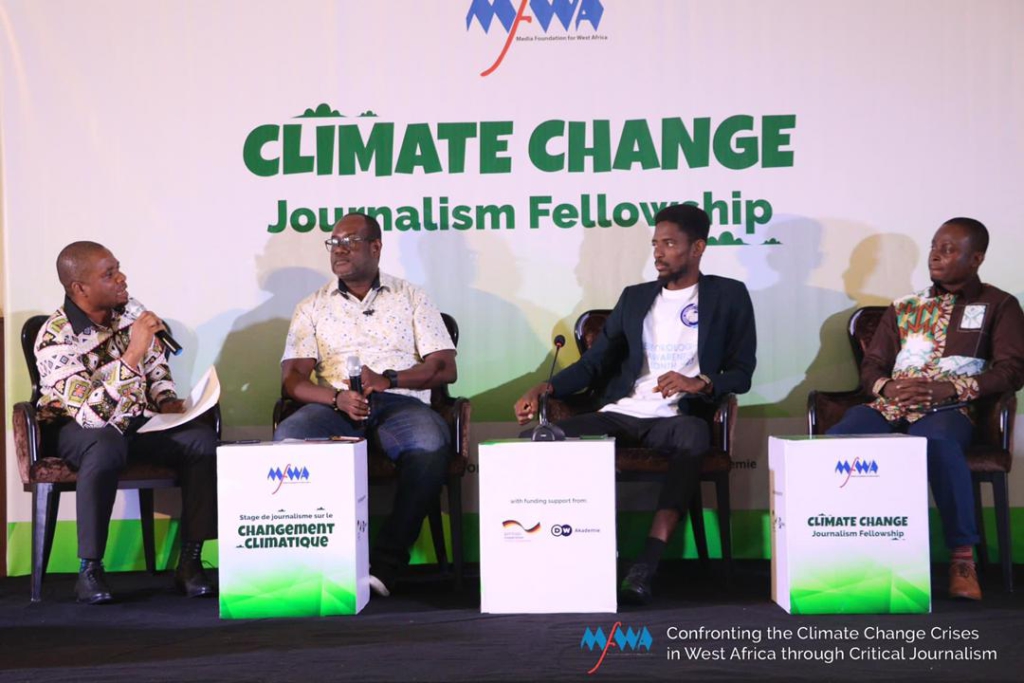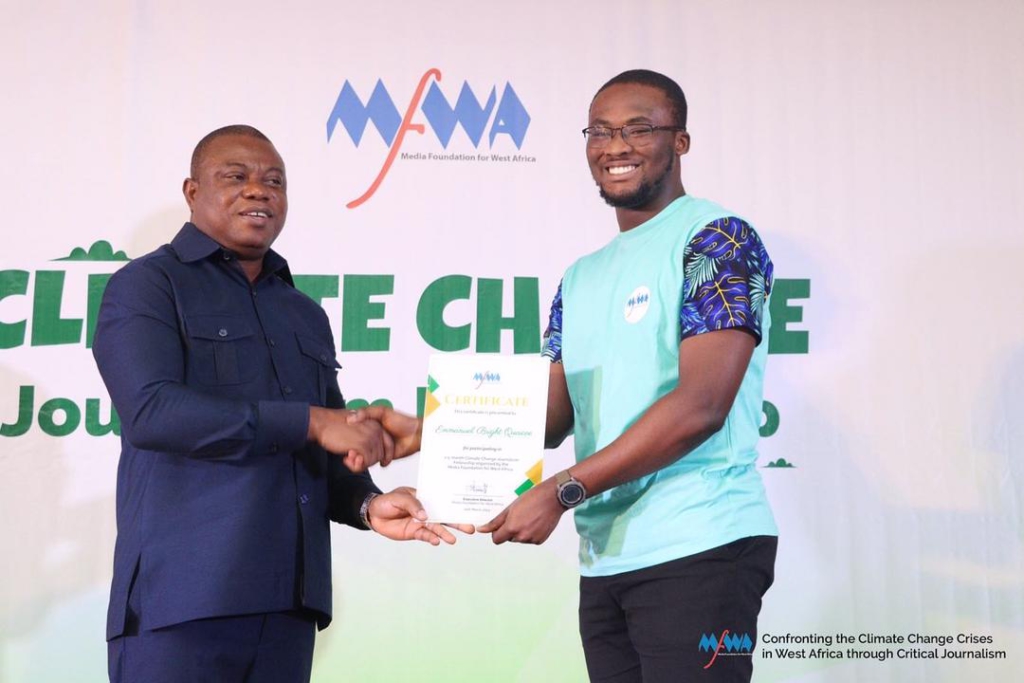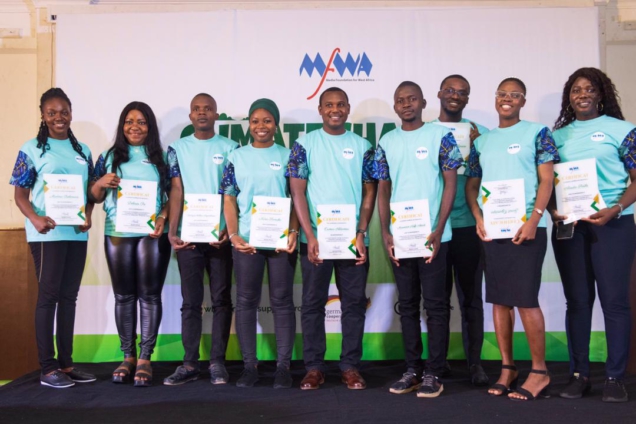Ten fellows of Climate Change Journalism by the Media Foundation for West Africa (MFWA) have been admonished to harness critical reporting as a tool to better tell climate change-related stories.
At a closing ceremony for the first cohort of the Fellowship, the journalists selected from ten countries across the sub-region were charged to be the voice of climate reporting and people affected by the changing climate.
From Ghana, Nigeria, Mali, Niger, Côte d'Ivoire, Burkina Faso, the Republic of Benin, Guinea, Senegal and Togo, the journalists - five males and five females - underwent a five-month training on covering and reporting climate change issues.
The event themed, “Confronting the Climate Change Crises in West Africa through Critical Journalism” was held on Friday in Accra-Ghana.
Director of Advocacy and Research at the MFWA, Dr. Kojo Impraim stated that it is pertinent to enhance climate change reporting and ensure it was at the "front burner" of news reportage, especially in the sub-region.
While appreciating the funders, DW Akademie, Dr Impraim noted that the fellowship was aimed at contributing to global initiatives in addressing the climate crisis which affects the Global South heavily.
“The climate is changing pervasively globally. In West Africa, the common manifestations are changes in rainfall patterns, extreme heat waves, drought, flooding, poor air quality & potability of water. The crisis before us is how to address the deleterious consequences of the climate crisis,” he said.

Head of Investigative Journalism at DW Akademie Ghana, Ama Kudjo emphasized the need for the fellows to spearhead climate reporting in West Africa.
“You have the opportunity to lead the charge for the change in climate and its issues in West Africa. Become the voice of climate reporting because you have been equipped to tell the story,” she said.
Chairperson for the event and the Chief Executive Officer, Forestry Commission, John Allotey, expressed his delight about pushing young journalists to specialise in climate reporting.
He believes their enthusiasm in writing and telling climate stories would pique the interest of others to act responsibly in mitigating climate change as awareness on the topic is less on the continent.
“We need young men and women who will stand and speak to the issue. The issues, development and technologies used in West Africa are the same. Their coming together has helped them to expand their network,” he said.
Allotey encouraged the fellows to not work in silos, but rather stand up to the polity, proffer local solutions, talk about the issues and communicate them passionately.
“Don’t be overly dramatic in your reportage. Apply local solutions and positive reinforcement. Report on the small changes and encourage those doing good, gauge the circumstance you find yourself at a particular time because timing [story reportage] is important,” he added.
The event also saw a panel discussion on the theme, involving state institutions including the Ghana Meteorological Agency, Forestry Commission and a media house, the Ghana News Agency.
A representative from the Ghana Metrological Agency, David Quaye, impressed upon the essentiality of journalists not only covering weather reports and crises stories including flooding.
While Climate change appears to be a technical subject, he charged journalists to report stories simply to their audience and also dedicate airtime or columns for climate-related stories.
“There are stories of migrants and women in the villages (affected by climate change) that do not make the front page. The media has a role to play in relaying the data from researchers to policymakers. Explain the impacts (of climate change) to the laymen and the local people who depend on local outputs for food. Educate the people on how their activities are impacting climate change,” he said.
Forestry Commission’s representative, Charles Sarpong, called for the inclusion of climate experts in climate discussions to provide technical knowledge to climate dialogues.
“We shouldn’t only be inviting politicians to our media programmes. We should invite experts and personalities who can explain the issues of the climate well. Read and upgrade yourself on what you have to do,” he said.

Meanwhile, Luv FM’s Emmanuel Bright Quaicoe has been adjudged the Best Story Writer under the Fellowship for his exceptional writing skills in reporting climate issues.
Latest Stories
-
Trump to extend TikTok sale deadline for third time, White House says
27 minutes -
All new Facebook videos to be classified as Reels soon, Meta says
39 minutes -
Togo suspends RFI and France 24 for three months, communications authority says
48 minutes -
Oil, gold, travel at risk – Expert on Ghana’s exposure to fallout from Middle East attacks
58 minutes -
‘Africa not immune’ – Expert warns Middle East conflict will hit Ghana hard
1 hour -
How the Air India crash investigation is unfolding
2 hours -
Uganda leader signs law reintroducing military trials of civilians
2 hours -
Court to hear matter between Dram Oil, Alfapetro Ghana Limited in October
2 hours -
2 arrested with concealed 86 parcels of suspected cannabis
2 hours -
Compassion International Ghana, environmental activists urge action as children are exploited into illegal mining
2 hours -
‘We are interconnected’ – Chatham House boss warns Ghana cannot ignore Middle East tensions
3 hours -
‘If you can’t marry, don’t have sex,’ Justice Sir Dennis Adjei says
3 hours -
Venice activists plan to disrupt Jeff Bezos’s wedding
3 hours -
Ghana has lost $11bn to gold smuggling, links to UAE, report finds
3 hours -
TikTok star Khaby Lame leaves US after being detained by immigration officials
4 hours

